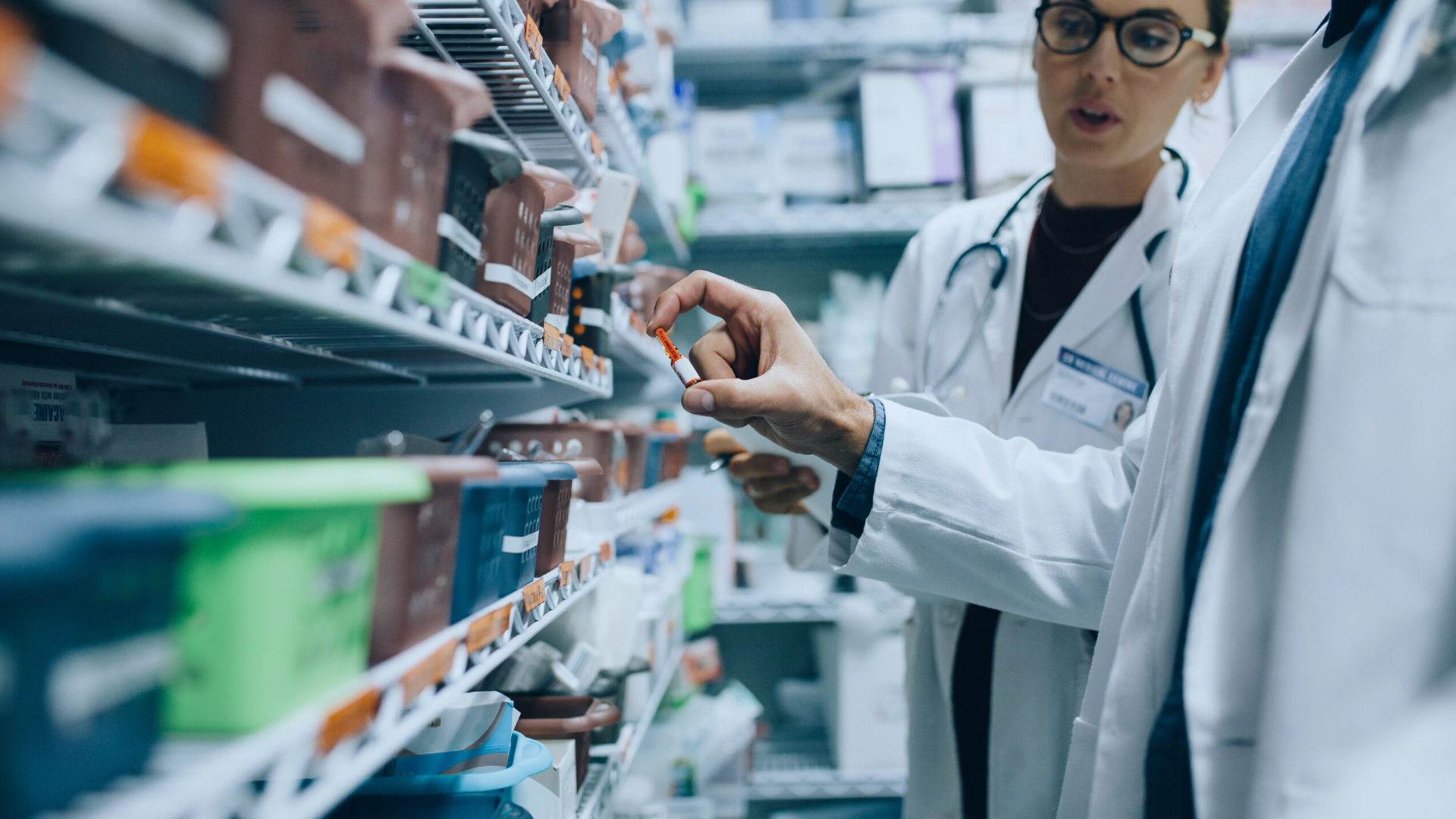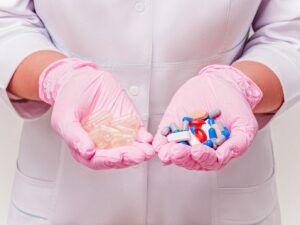The Role of a Clinic Pharmacy within a CRO

The clinic Pharmacy within a Clinical Research Organization (CRO), plays a fundamental role in the successful execution of a study. In collaboration with the trial sponsor, and the entire BioPharma Services team, the clinic pharmacy is involved from the beginning of the study in assessing any investigational drug product management related risk including storage, randomization, product preparation and distribution, as well as the blinding process and product administration, right through to the end of the study report and product disposition.
Once a study final protocol becomes available, pharmacy works with the sponsor through the Project Management team to coordinate the investigational drug products shipment and receipt to ensure that all the products are packaged and shipped in compliance with regulatory requirements. The Clinic Pharmacy coordinates with customs brokers for cross-border shipments as soon as the sponsor provides the shipping information.
The proper packaging and shipping method of the investigational drug products are important to maintain the integrity and quality of the drug products. All necessary precautions, to avoid potential transportation delays, and handling issues, are considered when the process is initiated.
At BioPharma Services, the investigational drug products are securely managed by the pharmacy with detailed records pertaining to their receipt, storage, dispensing, and disposition. The Pharmacy Department is composed of the experienced and trained pharmacy professionals who are delegated by the Principal Investigator for the safe and accurate distribution of the investigational drug products (IMPs).
These qualified individuals, with years of research experience, are performing all IMP-related duties and functions to ensure the maintenance of the IMPs integrity at the clinical trial site.
BioPharma Services Pharmacy Facility
The clinic pharmacy is located in a secured area, with restricted access to authorized personnel only. The pharmacy is used primarily for preparation and storage of the investigational drug products. These products are stored in locked cabinets, refrigerators, or freezers. Controlled substances are stored separately in a locked safe from the regular investigational drug products.
The temperature and humidity are strictly controlled to ensure the appropriate storage of any drug products and are continuously monitored by the electronic systems with automated alerts sent by phone, text and email should out-of-range temperature excursions occur. Each temperature monitoring device used in the pharmacy has a valid proof of calibration, which is maintained for reference.
Daily checks of the storage condition and other equipment maintenance are recorded following a standard operating procedure. The actions to be taken when the storage conditions are outside the specified range are outlined in the standard procedure (SOP).
Our clinic pharmacy allows for segregation of investigational drug products during dispensing. All the regular stocked investigational drug products are separated inside the locked cabinet, refrigerator or safe (for controlled substances). All stocked investigational drug products are clearly identified by the trial study numbers.
The clinic pharmacy has a yellow light system available which can be activated when compounding or dispensing light sensitive products. There is a clear process for the management of quarantined investigational drug products so that they will not be misidentified or used in error during the quarantine period.
We are equipped with a calibrated semi-micro balance and biological safety cabinets. Besides the regular oral tablets or capsule dispensing, we also conduct both sterile and non-sterile compounding preparation to deliver products to the individual subjects. Sterile compounding includes different kinds of parenteral formulations for the administration of SC, IM, IV, etc. Non-sterile compounds include, cream and ointment mixtures, oral solution, suspension, and topical solution. We ensure all pharmacy clinical trial procedures are in full compliance with the study protocol, drug manual and relevant guidelines and regulations.
Does a CRO Pharmacy need to be GMP?
At BioPharma Services, the clinical pharmacy team is responsible for preparing investigational drug products and dispensing into unit-dose for administration to individual subjects. Whether it is an oral dose formulation product or a product that involves some type of reconstitution, there are detailed procedures outlined in the study protocol, SOP, or a study specific directive. Oral formulation products used in the clinical trial, (i.e., tablets, capsule, oral solution, or suspension) are ready-to-dose finished products. At our site, pharmacy dispense them into tightly closed amber vial or oral syringes.
Reconstitution of investigational drug products is not considered manufacturing, as it is the simple process of dissolving or dispersing the investigational drug products for administration to a trial subject or diluting or mixing the investigation product with some other substance(s) used as a vehicle (diluent) for the purpose of administering it to a trial subject.
Since we are not manufacturing an investigational drug product by mixing several ingredients, including the active substances, we are not required to have a GMP facility. However, we conduct our investigational drug product dispensing activities in accordance with good manufacturing practice principles.
For any dispensing without a SOP procedure due to the unique requirement of the drug product, a written procedure would be the first step to the process in the collaboration with study sponsor. This written procedure, either a drug manual or pharmacy directive, includes all equipment required, and step-by-step guidance in the product compounding.
We handle one product at a time, and there is a full line-clearance between the treatment products dispensing to ensure that there is no change of cross-contamination or treatment product mix-ups. As for the reconstitution process, it is always undertaken as close in time as possible to administration, for the stability and safety of the finished product to the subject.
Pharmacy Packaging in Clinical Trial
Labels used for individual subject’s drug containers are generated by the clinic pharmacy using the provided Randomization Scheme from a Biostatistician/Client and checked by a Quality Control reviewer before they are printed and used. The contents of the individual dosing container labels follow the local regulations with all the necessary information for accurate identification of the product during the administration to the specific subject. The clinic Pharmacy is responsible for the overall accountability, starting from the investigational drug product receipt, through to the end of product disposition.
The clinic pharmacy source records include, the number of products received, when dispensed, who dispensed, how much was dispensed and how much remained, etc. This robust process ensures that the RIGHT drug treatment is dispensed to the RIGHT subject. Any retained investigational drug products are segregated at the time of receipt with a clear label.
The investigational drug product receipt, dispensing, reconciliation, and disposition process are all conducted by two pharmacy personnel to ensure the accuracy. All the source records are filed in a pharmacy binder, which is then transferred into the regulatory binder at the end of the clinical trial.
Pharmacy Handling Blinded Study
Many Phase I clinical trials are conducted in a double-blind design. Both staff and the patients/subjects, are blind whether they receive an active drug product or placebo. Pharmacy is usually the only department that is unblinded. The blinded randomization is secured in a locked cabinet, which is only accessible to the unblinded pharmacy staff.
For dispensing, at least two unblinded pharmacy staff, will dispense the doses per the randomization. Crucially, once a staff member is unblinded, they are not able to participate in any evaluation aspects of that study for those participants.
The blinding and unblinding process are outlined in the standard operating procedures or study specific directive. The label contents for the individual subject’s investigational drug product will not include the treatment product information, and the dispensing containers are covered or opaque to blind the administration staff and subject as well. The clinic Pharmacy is responsible to ensure the right treatment product is dispensed for the right subject, identified by a unique randomization number on the individual dosing label.
Designated pharmacy staff maintains the randomization and unblinds the treatment product in case of emergency for the required subject throughout the study. Since pharmacy is the only unblinded department, it is extremely crucial for pharmacy to ensure the accuracy in a blinded study dispensing.
Why Choose BioPharma?
Together with the rest of the healthcare professionals within our organization, BioPharma Services Clinic Pharmacy strives for success! We pay detailed attention in every aspect of the human clinical trials for delivering the investigational drug products in the most secure and safe way for patient and subject’s safety. Visit us today! Your trust is our path to success!
Find out why BioPharma might be the right partner for you! Learn more about BioPharma Services and the wide array of services we provide.
BioPharma Services, Inc., a Think Research Corporation and clinical trial services company, is a full-service Contract Clinical Research Organization (CRO) based in Toronto, Canada, specializing in Phase 1 clinical trials 1/2a and Bioequivalence clinical trials for international pharmaceutical companies worldwide. BioPharma has clinical facilities both in the USA and Canada with access to healthy volunteers and special populations.



